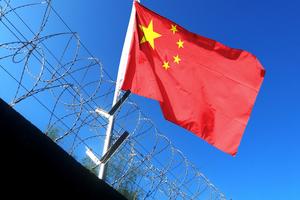Chinese Communist Party Erasing Religion with Village Renaming Effort
The 630 changes exhibit a greater campaign within China toward eliminating all religious belief, according to Reggie Littlejohn, founder and president of Women’s Rights Without Frontiers.

The Chinese Communist Party (CCP) has enacted a campaign of widespread renaming of villages across the Xinjiang province, in an attempt to remove references to religion or religious history.
Human Rights Watch (HRW), along with Norwegian organization Uyghyr Hjelp (“Uyghur Help”), released research on Wednesday, June 18. It reveals a systematized effort to reframe the traditionally Islamic and Uyghur names into Communist references.
By analyzing the National Bureau of Statistics of China, HRW uncovered that “the names of about 3,600 of the 25,000 villages in Xinjiang were changed” during the period of 2009 to 2023. The report states, “About four-fifths of these changes appear mundane, such as number changes, or corrections to names previously written incorrectly. But the 630, about a fifth, involve changes of a religious, cultural, or historical nature.”
These 630 changes exhibit a greater campaign within China toward eliminating all religious belief, according to Reggie Littlejohn, founder and president of Women’s Rights Without Frontiers, an international coalition devoted to exposing and opposing abortion, gendercide and sexual slavery in China.
“China is one of the greatest persecutors in the world on the basis of religion, and that includes all religions,” Littlejohn told the Register. “So be it the Uyghurs, Protestants, Catholic, Falun Gong … Christians believe that God is No. 1 and not the Chinese Communist Party, but the Chinese Communist Party wants to be on top, in terms of people’s loyalty.”
Uyghurs, part of an ethnic minority within China, traditionally practice Islam and speak the Uyghur language. They are the victims of an intense detention and imprisonment campaign, centralized in Xinjiang. The U.S. State Department designated Uyghur internment camps as “crimes against humanity” and as a part of the CCP’s “genocide against the predominately Muslim Uyghurs and other ethnic and religious minority groups in Xinjiang.”
The HRW report reveals that the government has been removing “any mention of religion,” as well as eliminating specific references to Uyghur historical figures or cultural practices, such as terms referring to Uyghur musical culture. Littlejohn said, “The renaming of the villages is a way of erasing from people’s minds and their vocabulary the history of that village and its connection with traditional Uyghur culture.”
The renaming occurs within the context of the greater persecution of all religious expression within China. In early June 2024, the U.S. Conference of Catholic Bishops (USCCB) released a statement, titled “Clamp Down on Religious Freedom in China.” The document states, “Religious freedom conditions in China have continued to deteriorate over the years. … China recognizes five religions ... but insists that these religions be 'Sinicized,' meaning that their teachings and doctrines should conform to and support those of the Chinese Communist Party.” The concealed contents of the 2018 China-Vatican agreement remain controversial, particularly with its potential third renewal approaching later this year.
Sen Nieh, professor emeritus of mechanical engineering at The Catholic University of America (CUA) and a fellow of the CUA Center for Human Rights, told the Register, “They’re persecuting not only religion, but belief. And, in general, they’re persecuting thoughts, how people think. … They change the history of the Chinese, particularly the contemporary history. They brainwash people to the benefit of their ruling.”
In addition to the brutal Uyghur persecution, Nieh highlighted the plight of Falun Gong practitioners, who have been intensely persecuted, particularly since a 1999 campaign. “There has been all kinds of torture methods, arbitrary detention. … The crackdown is very, very serious. One of the better-known cases is organ harvesting.” Organ harvesting is reported to be occurring within both Falun Gong and Uyghur communities, according to the United Nations.
The Human Rights Watch continues to pressure the United Nations to acknowledge China’s human-rights abuses in the Xinjiang province, releasing another statement Thursday morning. The statement urges the U.N. to call for international action to recognize “crimes against humanity” occurring in China.
Although the United Nations has not yet released an update, Chinese religious and human rights remain highly debated, with Steven Mosher, president of the Population Research Institute and author of the new book The Devil and China, telling the Register, “The CCP is determined to stamp out all religions in China, including Catholicism, and to this end has been rewriting history, changing names, and encouraging worship of the ‘Party,’ rather than God, from the very founding of the PRC [People’s Republic of China].”
- Keywords:
- chinese communist party
- religious freedom

















